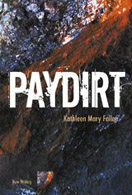 | Kathleen Mary Fallon PAYDIRT University of WA Press, 163 pp. Source: review copy Review by Perry Middlemiss |
I've never been particularly fond of the prose style known as "stream of consciousness": it has always seemed rather pretentious to me. Loosely defined in Wikipedia as "a literary technique which seeks to portray an individual's point of view by giving the written equivalent of the character's thought processes, either in a loose interior monologue, or in connection to his or her sensory reactions to external occurrences", the literary technique is one that a reader either gets or feels repelled by. I'm usually at the latter end of this scale.
So it was some degree of trepidation that I come to Paydirt by Kathleen Mary Fallon, a new Australian novel comprised of four "stream of consciousness" pieces. Kate is the white foster mother of Warren, a Torres Strait Islander boy, who was taken away from his mother as a young toddler. Kate and Warren are flying to Brisbane to see Flo, Warren's birth mother, as she is dying. These three characters, plus Delkeith, a go-between, tell their stories in turn; jumping backwards and forwards, gradually filling in the small details of their mutual history. The first and main piece of the book concerns Kate. She sits in the plane, drinking whiskeys, dreading the coming meeting, and trying to make sense of her feelings towards Warren and his place in her life.
I hate Warren. I hate him for showing me up to myself. My coy, closet Christianity. Hate him because he's the focus for all the abuse and filth that's been directed at me, because I chose him to hold up against that as proof of some pudding and now he's the conduit for it. Hate him because I saw what that violence has turned him into. The Stolen Generation's just the most recent story in a long epic. Some Christian re-enactment. Save him. Save myself. Hate him because it hasn't worked. I'm lost. I'm part of the Crusade, this maelstrom of involution. Everything is regressing, going back to some equilibrium, some point of origin. Hell spreads.She's completely conflicted and acts, in this novel, as the Australian white everyman: on the one hand being overwhelmed by a protective instinct that is part maternal and wholly human, and on the other, angry about the role she has had to play and the affect it has had on her. She ends her piece with an apology which runs for two pages, ending with a resolution that, while she is sorry for all that has happened and for all the things she she didn't do, she remains resolute in her desire to do what's best for Warren. How that will turn out, she, and we as readers, have no way of determining.
Paydirt hasn't got much in the way of plot, yet the story in the background is long and deep. The idea of telling a story completely in flashbacks is nothing new, though I suspect very few books have pushed it as far as this one. As I said earlier, whether you think it succeeds or not is a matter of personal taste. There are no easy answers here for any of the characters, just as there are no easy answers for the whole Australian community. But Fallon isn't looking for specific answers in her work. The aim is for the readers to read the thoughts of the main characters and hopefully come to some understanding, however small, of the problems that all parties face. This book doesn't aim to make big changes in our attitudes - I suspect the novel's audience will be largely sympathetic to the subject matter in any case - but even a little extra insight is an improvement.
